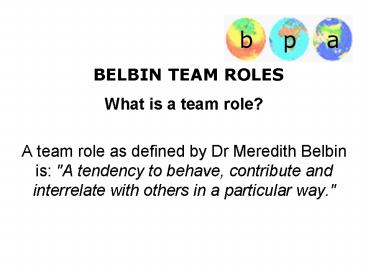BELBIN TEAM ROLES - PowerPoint PPT Presentation
1 / 11
Title:
BELBIN TEAM ROLES
Description:
BELBIN TEAM ROLES What is a team role? A team role as defined by Dr Meredith Belbin is: – PowerPoint PPT presentation
Number of Views:3916
Avg rating:3.0/5.0
Title: BELBIN TEAM ROLES
1
BELBIN TEAM ROLES
- What is a team role?
- A team role as defined by Dr Meredith Belbin is
"A tendency to behave, contribute and interrelate
with others in a particular way."
2
BELBIN TEAM ROLES
- Belbin team roles describe a pattern of behaviour
that characterises one persons behaviour in
relationship to another in facilitating the
progress of a team. - The value of Belbin team-role theory lies in
enabling an individual or team to benefit from
self-knowledge and adjust according to the
demands being made by the external situation.
3
BELBIN TEAM ROLES
- How did the concept originate?
- During a period of over nine years, Meredith
Belbin and his team of researchers based at
Henley Management College, England, studied the
behaviour of managers from all over the world. - Belbin's key book 'Management Teams - Why They
Succeed or Fail', was first published in 1981. - Managers taking part in the study were given a
battery of psychometric tests and put into teams
of varying composition, while they were engaged
in a complex management exercise.
4
BELBIN TEAM ROLES
- How did the concept originate?
- Their different core personality traits,
intellectual styles and behaviours were assessed
during the exercise. As time progressed different
clusters of behaviour were identified as
underlying the success of the teams. - These successful clusters of behaviour were then
given names. Hence the emergence of eight team
roles. A ninth, the Specialist, was added later
as an afterthought, but does not form part of the
original analysis.
5
BELBIN TEAM ROLES
- These are
- Action-oriented roles
- Shaper, Implementer, and Completer Finisher
- People-oriented roles
- Co-ordinator, Teamworker and Resource
Investigator - Cerebral roles
- Plant, Monitor Evaluator and (Specialist)
6
BELBIN TEAM ROLES
- Results from this research showed that there are
a finite number of behaviours or TEAM ROLES which
comprise certain patterns of behaviour which can
be adopted naturally by the various personality
types found among people at work. - The accurate delineation of these TEAM ROLES is
critical in understanding the dynamics of any
management or work team.
7
BELBIN TEAM ROLES
BELBIN Team Role Type Contributions Allowable Weaknesses
Completer Finisher Painstaking, conscientious, anxious. Searches out errors and omissions. Delivers on time. Inclined to worry unduly. Reluctant to delegate.
Co-ordinator Mature, confident, a good chairman. Clarifies goals, promotes decision-making, delegates well. Can often be seen as manipulative. Off loads personal work.
Implementer Disciplined, reliable, conservative and efficient. Turns ideas into practical actions. Somewhat inflexible. Slow to respond to new possibilities.
Monitor Evaluator Sober, strategic and discerning. Sees all options. Judges accurately. Lacks drive and ability to inspire others.
Plant Creative, imaginative, unorthodox. Solves difficult problems. Ignores incidentals. Too pre-occupied to communicate effectively.
Resource Investigator Enthusiastic, communicative, extrovert. Explores opportunities. Develops contacts. Over - optimistic. Loses interest once initial enthusiasm has passed.
Shaper Challenging, dynamic, thrives on pressure. The drive and courage to overcome obstacles. Prone to provocation. Offends people's feelings.
Specialist Single-minded, self-starting, dedicated. Provides knowledge and skills in rare supply. Contributes only on a narrow front. Dwells on technicalities.
Teamworker Co-operative, mild, perceptive and diplomatic. Listens, builds, averts friction. Indecisive in crunch situations.
8
BELBIN TEAM ROLES
- Belbin Team Roles within Teams
- The Co-ordinator clarifies group objectives, sets
the agenda, establishes priorities, selects
problems, sums up and is decisive, but does not
dominate discussions. - The Shaper gives shape to the team effort,
looking for pattern in discussions and practical
considerations regarding the feasibility of the
project. Can steamroller the team, but gets
results. - The Plant is the source of original ideas,
suggestions and proposals that are usually
original and radical. - The Monitor-Evaluator contributes a measured and
dispassionate analysis and, through objectivity,
stops the team committing itself to a misguided
task.
9
BELBIN TEAM ROLES
- Belbin Team Roles within Teams
- The Implementer turns decisions and strategies
into defined and manageable tasks, sorting out
objectives and pursuing them logically. - The Resource Investigator goes outside the team
to bring in ideas, information and developments
to it.They are the team's sales-person, diplomat,
liaison officer and explorer. - The Team Worker operates against division and
disruption in the team, like cement, particularly
in times of stress and pressure. - The Finisher maintains a permanent sense of
urgency with relentless follow-through.
10
BELBIN TEAM ROLES
- In small teams, people can, and do, assume more
than one role. - In addition, analysing existing teams and their
performance or behaviour, using these team role
concepts, can lead to improvements, for example - Under-achievement demands a good coordinator or
finisher - Conflict requires a team worker or strong
coordinator - Mediocre performance needs a resource
investigator, innovator or shaper - Error prone teams need an evaluator
11
BELBIN TEAM ROLES
- Different roles are important in different
circumstances, for example - New teams need a strong shaper to get started.
- Competitive situations demand an innovator with
good ideas. - In areas of high risk, a good evaluator may be
needed. - Teams should, therefore, be analysed both in
terms of what team roles members can play, and
also in relation to what team skills are most
needed.






























